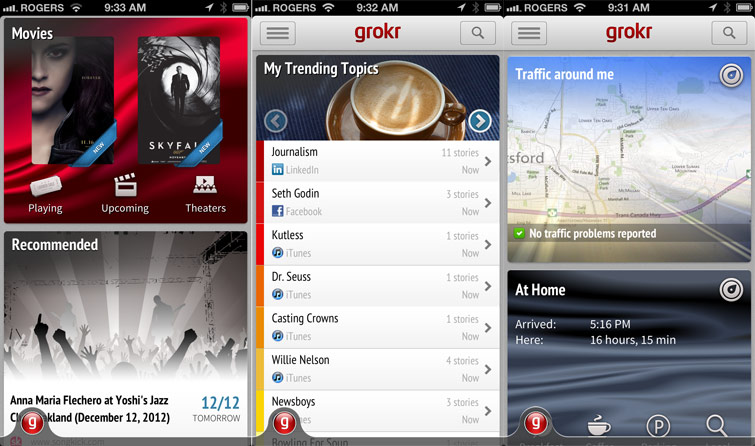 Today Grokr is releasing a Google Now for iOS. Except, not exactly. Actually, it’s much better than Google Now, and it is likely to stay that way for a long time.
Today Grokr is releasing a Google Now for iOS. Except, not exactly. Actually, it’s much better than Google Now, and it is likely to stay that way for a long time.
Google Now is a background-level app embedded in Android (as of 4.1, Jelly Bean) which provides ambient access to relevant data: weather, time, traffic conditions around you, and the score of the big game. Grokr does that, too, but it also does much, much more. And it accesses information that Google will likely never be able to get its hungry little data paws on.
“Our whole idea was to reimagine search, to building search where knowledge just finds you,” Grokr CEO Srivats Sampath told me when we chatted yesterday. “Search on mobile breaks down … search companies took what was built for the PC and put it on a phone, but the phone is a completely different user experience. The phone has so many sensors that you can make it more intelligent … make it predictive.”
 So the goal is to get you the information you want before you know you need it.
So the goal is to get you the information you want before you know you need it.
AI Weekly
The must-read newsletter for AI and Big Data industry written by Khari Johnson, Kyle Wiggers, and Seth Colaner.
Included with VentureBeat Insider and VentureBeat VIP memberships.
Google Now does that too, using your calendar information (if you’re using Google’s calendaring functionality), your email (if you use Gmail), your search history (OK, everyone uses Google for searching), the weather (based on your location), and more.
But there’s a whole class of things that Google doesn’t include — and likely will never be able to include.
I’m talking about all the data and information about you, your friends, and the things you care about that is stored and transmitted via social networks: Facebook, Twitter, and, to a lesser degree, LinkedIn. That’s where Grokr shines, connecting to those services and integrating data from them — and 60 to 70 other sources — into its predictive algorithms which then work hard to surface just what you want, when you want it.
“That’s the key differentiating factor for us: We want to go where the users are — we are able to integrate with Facebook, with Foursquare, with LinkedIn, and Twitter,” Sampath says. “Google wants to keep you within their ecosystem.”
The end result is not telepathy, but it’s close.
For instance, Grokr noticed that I’m a journalist, and it showed me trending topics about journalism on Twitter. The app asked for access to my iPod app, analyzed the songs I have, and it told me about upcoming concerts with some of those artists. It noticed I’m interested in James Bond, and it showed me theater times for Skyfall. It saw that I’m a cofounder in a coworking startup and added coworking to my list of interests.
“We can only remember five to seven things at one time,” Sampath said yesterday. “But the number of things we want to remember is maybe in the thousands. We now can outsource that cognitive process to the cloud … outsource your brain to the cloud.”
 Of course, Grokr’s not always right.
Of course, Grokr’s not always right.
That’s partially due to bad information (yes, my kids used to listen to Raffi, and yes, that music is still in my iTunes library) and partially due to the failings of the algorithm (a jazz concert in Oakland, Calif. tomorrow by an artist I like is not really all that relevant, given the fact that I’m in Vancouver, Canada right now). And I’ve already seen Skyfall.
But it is helpful, and it is better than my experience in the past few months with Google Now.
“To build this service, we had to build your graph of graphs,” Sampath told me. “The app eventually knows more about you than your mom — I’m learning so much about myself … it’s quite an eye-opener.”
The Grokr team has also put a lot of effort into understanding entities, not just terms. Web search is built into Grokr for those times when the knowledge does not just come right to you, and Grokr uses Freebase (as does Google) to understand not just terms but concepts, meaning that it can group search results by categories and help you refine your results.
The current list of data sources is just the beginning, Sampath says.
Coming soon are sources like Fitbit, Nike+, and other self-quantification services, including health data based on location, environment, and ethnicity.
Competing against Google, of course, is not easy, even when you’re doing it on iOS. But the fact that Google will have great difficulty convincing Facebook and other social networks to open social data to their biggest competitor does give Grokr something of a moat of protection.
This is just starting to get interesting.
VentureBeat's mission is to be a digital town square for technical decision-makers to gain knowledge about transformative enterprise technology and transact. Learn More
